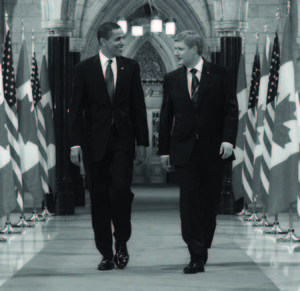Washington, DC - Whenever one reads a title including “Who Lost…” you know that ax grinding is about to start with the whetstone spinning. There is a blame game to be played and guilt to be apportioned. Thus, variously, over the decades, the outraged have exclaimed “Who Lost China?” “Who Lost Vietnam?” “Who Lost Iran?” and currently, preemptively lamenting over who lost Afghanistan and/or Iraq. The author(s) always know that others are at fault and they knew better.
Thus the Derek Burney/Fen Hampson Foreign Affairs article addressing “How Obama Lost Canada” is of similar ilk.
These are such tediously predictable efforts (one would exult in reading one entitled “Who Found Canada/etc?”) replete with woe-is-us litanies of unnecessary—to the author(s)—failures and absent solutions to predictable problems.
There is an implicit arrogance in the “lost” motif—as if somehow the United States owned Canada and mislaid it in a fit of absentmindedness. Of course, the United States does not own Canada (and hasn’t tried since 1812), and President Obama's propensities are for accommodation rather than confrontation in virtually every aspect of domestic and foreign relations.
 Burney/Hampson runs through a laundry list of alleged disrespects that leave one head shaking. Or wonder whether they have morfed into injustice collectors rather than diplomats and negotiators. Because what they primarily identify are traditional problems and issues of the “weeding your garden” nature, subject to management rather than anguish. So we have belches of indigestion over “Trade America” (a congressional venture that never eventuated); charges of protectionism over NAFTA implementation; laments that we don’t see the Arctic/Northwest Passage as does Canada; the Detroit-Winsor bridge; and generally lack-of-love. One is surprised they haven’t resurrected hardy perennials such as softwood lumber, Pacific Coast salmon, and perceived intellectual property concerns.
Burney/Hampson runs through a laundry list of alleged disrespects that leave one head shaking. Or wonder whether they have morfed into injustice collectors rather than diplomats and negotiators. Because what they primarily identify are traditional problems and issues of the “weeding your garden” nature, subject to management rather than anguish. So we have belches of indigestion over “Trade America” (a congressional venture that never eventuated); charges of protectionism over NAFTA implementation; laments that we don’t see the Arctic/Northwest Passage as does Canada; the Detroit-Winsor bridge; and generally lack-of-love. One is surprised they haven’t resurrected hardy perennials such as softwood lumber, Pacific Coast salmon, and perceived intellectual property concerns.
It is necessary, however, to rebut two particularly invidious charges: the Keystone pipeline and Afghanistan.
Setting aside the ad hominem charge that Burney has a personal interest in Keystone, it is simply a classic domestic political battle: Obama seeks to mollify two constituencies—blue collar construction/manufacturing workers and environmentalists. The former wants Keystone-related jobs; the latter reject carbon-related energy. So Obama kicked the can down the road (Canadians would have instituted a royal commission), saying that the environmental statement was inadequate. When Congress attempted to force a decision, again the White House called for further environmental review. In each case, the White House tied the can to the State Department tail as responsible for the review. But the rationale for delay was risible; the issue had been reviewed to a fare-thee-well over four years, concluding no significant environmental impact. It was pathetic as an ancien diplomat to watch State spokespersons regurgitating their talking points and attempting to put nonpolitical gloss on the delay.
But PM Harper professionally appreciates election year politics; he threw no hissy fit (and Obama’s suggestion that Trans Can reapply was a wink/wink indication that post-election, it would be approved). Instead, he offered a neat reminder Canada should investigate other options, e.g., Northern Gateway—an approach useful in any regard. Indeed, Keystone reminds one of Jean Chretien’s 1993 campaign commitment to review the terms of the pending NAFTA agreement (implying to its haters a delay/renegotiation). At the time, U.S. reps held our tongues--ultimately to good effect.
More invidious is the charge that Canada participated in Afghanistan “primarily” to strengthen its partnership with the United States. To remind, Afghanistan is a UN-endorsed, NATO-implemented commitment against terrorism with at one count 46 participating countries. We assume Canadians appreciated the global threat of al-Qaeda/Taliban and responded commensurately. To be sure, the Canadian commitment (sixth in total numbers in 2011) is never denigrated, and Canadian Forces professionalism was exemplary. But Canada’s commitment, the operation of its forces, the timing of their withdrawal has been at Ottawa’s volition.
The result of the Afghan commitment has been positive for Canada—renewed credibility in NATO corridors and command of the Libya “no fly” operation.
More generally, should the USA desire, we could belabor Canadian failures in the relationship: While we have moved beyond the personalized disrespect for U.S. leadership epitomizing the Chretien/Martin years, there are still significant irritants: paltry defense spending; dilatory action on intellectual property protection; continued unconcern for ballistic missile defense; border security characterized by reluctance and bureaucratic niggling; dairy/poultry price management limiting U.S. exports. Has Harper “lost” Washington? Of course not.
The reality remains. We live in “interesting” times; Washington faces massive domestic economic challenges; foreign policy problems range from Russian “reset” to Iran/Iraq/Afghanistan. Patience is better than petulance.

























Comments
Please login to post comments.